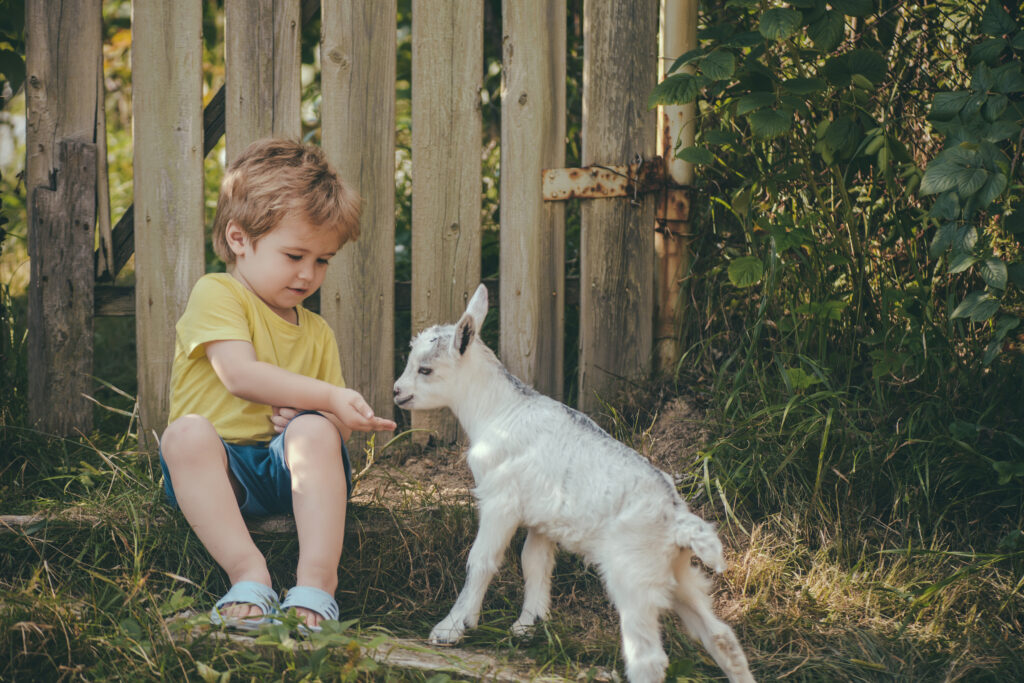
The Comprehensive Guide to Nurturing Baby Goats: A Journey of Care and Affection
Introduction
Baby goats, with their adorable antics and inquisitive nature, captivate hearts and evoke a profound sense of responsibility. As their caretaker, you embark on a journey of providing them with the utmost care and attention to ensure their well-being and optimal development. This comprehensive guide will equip you with the essential knowledge and practical tips to navigate the challenges and joys of raising baby goats.
Housing and Environment
- Shelter: Provide a clean, dry, and well-ventilated shelter that protects the kids from harsh weather conditions. Ensure adequate space for them to move around comfortably.
- Bedding: Use soft and absorbent materials such as straw or wood shavings for bedding. Change the bedding regularly to maintain hygiene.
- Temperature: Baby goats are sensitive to temperature fluctuations. Maintain a comfortable temperature range of 60-70°F (16-21°C) for the first few weeks of life.
- Hygiene: Keep the shelter and surroundings clean to prevent disease transmission. Regularly remove manure and disinfect surfaces.
Nutrition
- Colostrum: Colostrum, the first milk produced by the mother goat, is vital for providing antibodies and nutrients to the kids. Ensure they receive colostrum within the first 24 hours of birth.
- Milk: Baby goats require a high-quality milk replacer or goat’s milk for the first 8-12 weeks of life. Feed them 4-6 times per day, gradually reducing the frequency as they grow.
- Water: Provide fresh, clean water at all times.
- Creep Feed: Introduce creep feed, a high-protein supplement, around 3 weeks of age to encourage early rumen development.
Health and Care
- Vaccinations: Consult with a veterinarian to determine the appropriate vaccination schedule for your goats. Vaccinations protect against common diseases such as tetanus and clostridium.
- Deworming: Regularly deworm the kids to prevent parasitic infections.
- Hoof Trimming: Trim their hooves every 6-8 weeks to prevent overgrowth and discomfort.
- Castration: If you do not intend to breed the male kids, castration is recommended to prevent unwanted pregnancies.
- Common Illnesses: Be aware of common illnesses such as pneumonia, diarrhea, and mastitis. Seek veterinary attention promptly if you notice any signs of illness.
Socialization and Training
- Socialization: Baby goats are social animals. Allow them to interact with other goats and humans to promote their well-being and trainability.
- Training: Start training the kids early on using positive reinforcement. Teach them basic commands such as "come," "stay," and "leave it."
- Bottle Feeding: If you are bottle feeding the kids, use a slow-flow nipple to prevent aspiration. Hold them upright while feeding to reduce the risk of bloat.
Weaning and Transition
- Weaning: Gradually wean the kids from milk to solid feed over a period of 2-3 weeks. Start by reducing the amount of milk and increasing the amount of creep feed.
- Transition to Pasture: Once the kids are fully weaned, gradually introduce them to pasture. Supervise them closely to ensure they do not overeat or bloat.
- Shelter and Protection: Provide adequate shelter and protection from predators and the elements as the kids transition to pasture.
Special Considerations
- Orphaned Kids: If you find an orphaned kid, provide immediate care by warming it up and feeding it colostrum or milk replacer. Contact a veterinarian for further guidance.
- Premature Kids: Premature kids require special care and attention. Keep them warm, provide frequent feedings, and monitor their weight closely.
- Bottle Feeding: Bottle feeding requires patience and consistency. Follow the feeding schedule and ensure the kids are getting the proper nutrition.
Conclusion
Raising baby goats is a rewarding experience that requires dedication, care, and a deep love for these charming creatures. By following the comprehensive guidelines outlined in this article, you can provide your baby goats with the optimal environment, nutrition, and care they need to thrive and bring endless joy to your life. Remember, the well-being of your goats is paramount, and seeking professional veterinary advice whenever necessary is crucial for their health and happiness.
